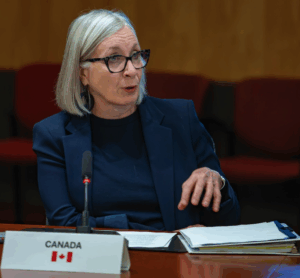After minister of jobs and families Patty Hajdu announced new federal programs for families on Friday, October 10, including an expansion to school food programs, automatic tax-filing for low-income families, and a renewal of the Canada Strong Pass program, she spoke with Nexus to discuss issues concerning post-secondary student success, both in the classroom and in the job market post graduation.
Hajdu says that while post-secondary is predominantly funded by provincial governments, affordability for all Canadians, including students—ensuring they can support their livelihoods while maintaining education—is a priority for the federal government. Funding for education and employment includes the Work Integrated Learning Program, job skills training, and programs that aid attachment to particular sectors, which she says in concert with student loan and grant changes can help students achieve long-term success.

“The Canada student loans and grants changes that we’ve made in the last number of years are really helping with the affordability of post-secondary in general, including the interest-free loan component, which is allowing students to take loans for school without worrying about becoming further indebted in larger ways and gives people that confidence to be able to take that loan, go to school, figure out their next steps,” she says.
Hajdu says that the federal government is currently looking to increase support further to help individuals going back to school for smaller programs to increase their earning abilities and make better wages.
“The prime minister is committed to creating a Lifelong Learning Benefit,” she says, “and we’re working through the details of what that could look like now. So this would be more for not necessarily recent grads, but people who are working and want to improve their skills by taking a small course, maybe an accounting course, or a different kind of study that would allow them to increase their earnability, their earnings and their wages.”
In 2024, the federal government introduced a cap on international student study permits in an effort to ease what it believes contributes to the strain on housing, health care, and other public services. While this mandate was not created under prime minister Mark Carney, Hajdu agrees with the extension of this decision, saying that “bringing in post-secondary students from other countries at a very high volume without the capacity to absorb people into communities has created a fracture in the perception by Canadians that our immigration system is working.”
“Urban centres have really struggled to understand how it is that they’re going to absorb, you know, that many young adults that don’t have necessarily the supports, don’t have necessarily the appropriate housing, don’t necessarily have a pathway to permanent residency,” she says. “The actions we took last year were really to get the system back under control… So in terms of reversing that decision, no, that’s not going to happen. Financing post-secondary students, in some cases very vulnerable students, from other countries without providing the support they need to thrive in Canada is not sustainable.”
As a member of parliament for 10 years, Hajdu has previously served in roles as minister of status of women; minister of employment, workforce development and labour; minister of health; and minister of Indigenous services. She says that during her career she has drawn from her experience as a first-generation graduate.
“I’m the first in my family to graduate from college or university. And I was actually for years on a committee in Ontario to try to increase the number of people like me: first-gen students who go to post-secondary, and I think what has united me across all of those portfolios is that opportunity is not equitable,” says Hajdu. “And the biggest role that the government has is to create a fair playing field. And it’s not fair for a whole bunch of reasons… In all of the jobs I’ve held, I’ve asked myself the questions [about] who isn’t being represented in this policy, and how do we make this policy or program or approach more fair so that people from all different walks of life are going to benefit?”
She says that using her compassion for diverse communities of Canadians is “not just the nicest thing to do, it’s the smart thing to do.”
“When we actually have communities where people feel valued, cared for, important, included, and living with purpose, our communities are safer, they’re more prosperous,” she says. “And they’re healthier, and so ultimately, the foundation of politics, for me, is something called the social determinants of health. Trying to make sure we design communities where people have dignity in life, a purpose, and fairness built in, and so that’s kind of the uniting thread across all those purposes.”

